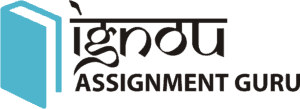Create an Effective Study Schedule for IGNOU Exam
Studying for IGNOU exams can be a challenging task, especially considering the flexible learning environment it offers. However, by creating an effective study schedule, you can ensure that you cover all the necessary topics and achieve the desired results. In this article, we will discuss the importance of a study schedule and provide step-by-step guidance on how to create one for your IGNOU exam preparation. So, let’s dive in!
Introduction
When preparing for IGNOU exams, having a well-structured study schedule is crucial to manage your time effectively and ensure comprehensive coverage of the syllabus. A study schedule acts as a roadmap that keeps you organized, motivated, and on track to achieve your academic goals. Let’s explore the process of creating an effective study schedule tailored to your IGNOU exam preparation needs.
Understanding IGNOU Exams
Before we delve into creating a study schedule, it’s essential to understand the nature of IGNOU exams. IGNOU (Indira Gandhi National Open University) follows a flexible learning system, allowing students to study at their own pace. However, this flexibility also requires students to be self-disciplined and responsible for managing their study time effectively.
IGNOU exams are conducted twice a year, in June and December, for various courses and programs offered by the university. These exams assess the knowledge and understanding of the subjects covered throughout the study period. Therefore, a well-organized study schedule becomes even more critical to ensure comprehensive preparation.
You can also buy Solved Papers and Solved Guess Papers
Importance of a Study Schedule
A study schedule plays a vital role in your exam preparation journey. Here’s why it is crucial:
- Time Management: A study schedule helps you allocate dedicated time to each subject, ensuring you cover all the topics within the available time frame.
- Organization: It keeps your study materials, resources, and tasks well-organized, reducing stress and allowing for a systematic approach to learning.
- Motivation: Having a study schedule creates a sense of responsibility and accountability, keeping you motivated and focused on your goals.
- Efficiency: With a well-structured study schedule, you can optimize your study time by prioritizing important topics and avoiding procrastination.
- Consistency: Following a study schedule promotes consistent study habits, preventing last-minute cramming and ensuring better retention of knowledge.
Now that we understand the importance of a study schedule, let’s proceed with the step-by-step process of creating an effective one for your IGNOU exam preparation:
Assessing Your Study Needs
Before diving into creating a study schedule, take some time to assess your study needs. Evaluate the subjects you need to cover, their difficulty level, and the amount of time you have until your exams. This assessment will help you identify your strengths and weaknesses and prioritize your study areas accordingly.
Setting Clear Goals
Setting clear goals is essential for effective studying. Determine what you aim to achieve in your IGNOU exams and break down your goals into smaller, manageable milestones. This will provide you with a sense of direction and help you stay focused throughout your study schedule.
Time Management Techniques
Time management is the key to success when preparing for exams. Implement effective time management techniques such as the Pomodoro Technique (working in focused bursts with short breaks), prioritizing tasks based on their importance and urgency, and eliminating distractions to make the most of your study time.
Creating a Study Schedule
Now, let’s create your study schedule. Start by dividing your available study time into smaller, manageable study sessions. Determine the duration of each study session based on your concentration span and energy levels. For example, you could have study sessions of 45 minutes with a 10-minute break in between.
Allocating Time for Each Subject
Next, allocate dedicated time slots for each subject or topic you need to study. Consider the importance and difficulty level of each subject and distribute your study time accordingly. Ensure that you allocate sufficient time for subjects that require more attention and practice.
Balancing Study and Other Responsibilities
As an IGNOU student, you might have other responsibilities such as work, family, or personal commitments. It’s crucial to strike a balance between your study time and other obligations. Allocate specific time slots for these responsibilities in your study schedule to ensure a harmonious routine.
Implementing Effective Study Strategies
While creating your study schedule, incorporate effective study strategies that suit your learning style. Experiment with various techniques such as active reading, summarizing key points, creating mind maps, or teaching concepts to someone else. Find what works best for you and integrate it into your study schedule.
Creating a Distraction-Free Environment
To maximize your study efficiency, create a distraction-free environment. Find a quiet and comfortable study space where you can focus without interruptions. Keep your study area organized and free from distractions like mobile phones, social media, or noisy surroundings.
Utilizing Study Resources
Make the most of the study resources available to you. IGNOU provides study materials, textbooks, online resources, and previous years’ question papers. Incorporate these resources into your study schedule and utilize them effectively to enhance your understanding and preparation.
Tracking Progress and Making Adjustments
Regularly track your progress and make necessary adjustments to your study schedule. Assess your performance in practice tests or mock exams to identify areas where you need more focus. Modify your study schedule accordingly to address any weaknesses and ensure balanced preparation.
Taking Breaks and Practicing Self-Care
Remember to incorporate breaks into your study schedule. Taking short breaks between study sessions allows your mind to recharge and enhances your overall productivity. Additionally, prioritize self-care activities such as exercise, proper sleep, and healthy eating to maintain your physical and mental well-being during your exam preparation.
Reviewing and Revising the Schedule
Regularly review and revise your study schedule as needed. As you progress in your preparation, you might need to make adjustments based on your evolving needs and priorities. Be flexible and open to modifying your schedule to accommodate unforeseen circumstances or new study requirements.
Conclusion
Creating an effective study schedule for your IGNOU exams is crucial for managing your time, staying organized, and achieving your academic goals. By assessing your study needs, setting clear goals, implementing time management techniques, and creating a well-structured schedule, you can optimize your exam preparation. Remember to allocate dedicated time for each subject, balance your study with other responsibilities, and utilize effective study strategies. Create a distraction-free environment, make use of available study resources, and track your progress regularly. Taking breaks and practicing self-care are essential for maintaining your well-being during the preparation phase. Finally, review and revise your study schedule as needed to ensure it aligns with your evolving needs.
By following these steps and implementing a study schedule tailored to your requirements, you can effectively prepare for your IGNOU exams and increase your chances of success.
FAQs
Can I customize the study schedule according to my preferences?
Absolutely! Your study schedule should be personalized to suit your preferences and study habits. Modify the duration of study sessions, adjust subject priorities, and include breaks at times that work best for you. Customizing your study schedule will enhance your motivation and overall productivity.
Should I study the difficult subjects first?
It's a good practice to tackle difficult subjects or topics first while you're fresh and have higher concentration levels. By studying challenging subjects early in your study session, you can approach them with a clear mind and allocate sufficient time for understanding and practice.
How can I stay motivated while following the study schedule?
Staying motivated during your exam preparation can be challenging. To maintain motivation, set achievable goals, reward yourself for meeting milestones, and visualize your success. Surround yourself with a supportive study group or seek accountability from a study partner. Additionally, take regular breaks, engage in activities you enjoy, and remind yourself of the long-term benefits of your hard work.
Is it necessary to stick strictly to the study schedule?
While it's important to maintain discipline and adhere to your study schedule as much as possible, occasional adjustments are normal. Life events or unforeseen circumstances may require modifications to your schedule. The key is to strike a balance between following your schedule and being adaptable when needed. Flexibility allows for a more sustainable and effective study routine.





